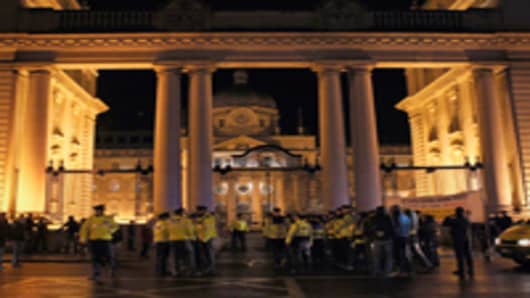Ireland goes to the polls on Friday in a general election expected to sweep the ruling coalition from power – the first defeat for a eurozone government since the onset of the debt crisis.
With the centre-right Fine Gael party within sight of its first-ever outright majority, the election promises to produce the biggest change in Irish politics since 1932.
A win for Fine Gael would underscore the right-of-centre instincts of Irish voters, who even amid the worst economic collapse in the country’s 89-year history look set to turn to a moderate conservative alternative to the outgoing Fianna Fáil, rather than to leftwing parties.
Fine Gael, led by Enda Kenny, a former primary school teacher from western Ireland, has campaigned on a low tax and pro-business platform.
Latest opinion polls forecast his party will secure about 39 percent of first preference votes, ahead of Labour (20 percent) and the ruling Fianna Fáil (18 percent).
The count will start on Saturday.
Sinn Féin, a party on the radical left and better known for its former links with the Irish Republican Army paramilitary organisation in Northern Ireland, is expected to double its six seats.
Independents are also predicted to do well, feeding on widespread anger towards all mainstream parties.
Paddy Power, the bookmakers, make Fine Gael odds on favourites to form a government with Labour, the traditional coalition partners.
Fianna Fáil faces its worst defeat. After 14 years in power it is blamed for the property and banking crash, which has led to a humiliating bail-out by the European Union and the International Monetary Fund and the harsh budgetary measures needed to address the crisis.
The new government faces a daunting task as Ireland, under the watchful eye of the IMF, administers a fiscal adjustment that will see €15 billion ($20.5 billion) in public expenditure cuts and tax increases during the next three years as the country seeks to stabilise its public finances and avoid a debt restructuring.
Mr Kenny and his Labour counterpart, Eamon Gilmore, have pledged to seek a renegotiation of the terms of the EU-IMF bail-out, amid worries that, with growth stalling, Ireland may find it difficult to meet its international obligations.
Richard Bruton, a Fine Gael finance spokesman, confirmed the party had enlisted Pat Cox, the Irish-born former president of the European parliament, to support the party “in the transition” to power.
Mr Bruton said the appointment was “to assist us in ensuring we make the early decisions if we do get a mandate”.
Fine Gael and Labour were in coalition in 1982-1987 during an earlier economic emergency, when Labour failed to support tough fiscal measures.
It was left to the incoming Fianna Fáil government of Charles Haughey to administer the reforms, which paved the way for the Celtic Tiger economy of the 1990s.


